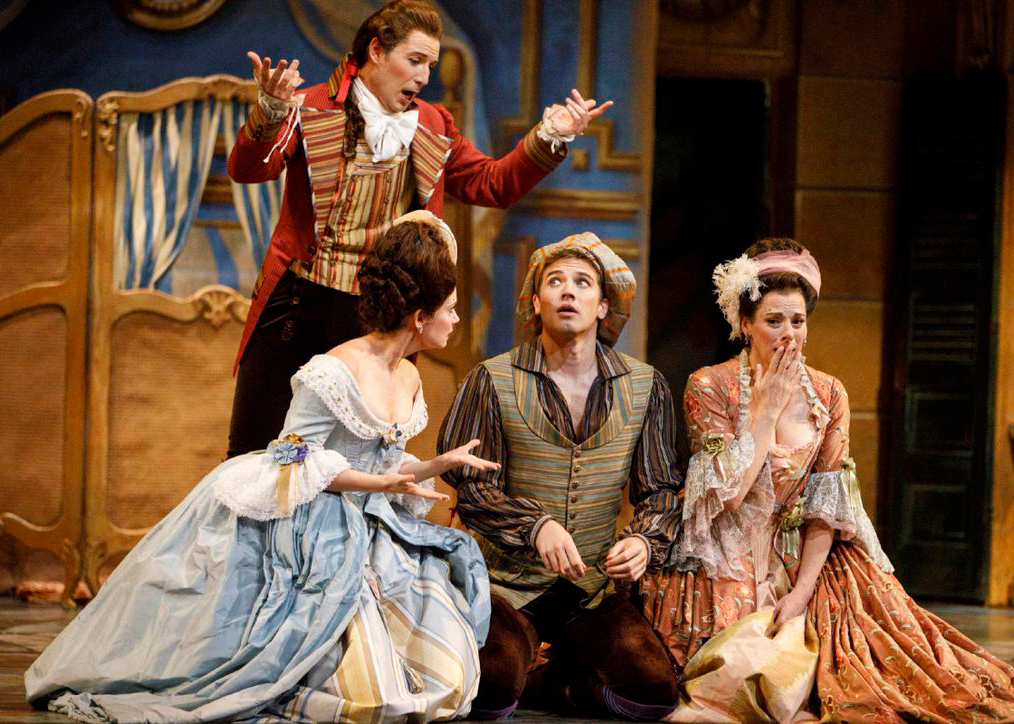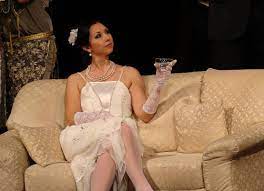This is the second half of a post about ‘distressingly old-fashioned’ musical texts. The narratives of some famous operas have been updated. My purpose is to help 21st Century sopranos and contraltos retain a broad repertoire without having to grit their teeth.
Stirring the plot – Part 2
In his interview with soprano Carolyn Sampson on the Music Show (1 May 2021), Andrew Ford reflects that “If this were an opera – because there are all sorts of problematic opera roles in a similar vein – there are any number of ways in which it could be staged to throw some critical 21st Century light on it.”
Inspired by this observation, and to help Carolyn Sampson and other performers retain access to the full operatic repertoire, I have taken up the challenge of modernising the narrative of some of the best-known operas. For guidance I am indebted to the revised and expanded edition of Stories of Famous Operas by H. V. Milligan, 1955.
Romeo and Juliet
Gounod’s opera follows the same unlikely plot line as William Shakespeare’s, written at some time between 1591 and 1595. In that distressingly old-fashioned version – presumably just for the theatrical schtick it provides – the two lovers die in each other’s arms. A new ending is proposed providing a much more rational narrative.
In the last scene, after the duet “Juliet est vivante!” (“Juliet is alive!”) , Romeo realises how inconvenient it is that, thinking her already dead, he has just drunk liberally from a phial of poison. Juliet picks up the empty phial and gently abuses Romeo for not leaving her a drop or two for herself. They have a brief moment to say farewell in the last of their love-duets “Console-toi, pauvre âme” (“Yield not to sorrow”). Romeo slips from her arms and falls to the ground.
Then follows the updated ending to the opera, in which Juliet sings the new aria “Tant pis: voici le smallprint” (“Oh well: at least he was insured”). Then, remembering the kitchen knife in her pocket, Juliet places it on the ground next to Romeo, and exits stage left.

The Marriage of Figaro
Revised and updated Act 4.
Scene: Garden of Count Almaviva’s home
The comedy is based on mistaken identity. Susanna (the Countess’s maid and fiancée to Figaro) and the Countess Almaviva have changed costumes to catch the Count in his attempted flirtation with Susanna. The Count discovers Cherubino (Page to the Count) flirting with the Countess disguised as Susanna. Then, thinking that Susanna is his wife, the Count chases Cherubino away and comes on to her himself. The Count discovers Figaro (the Count’s valet) apparently chatting up the Countess – whereas it is really Susanna.

The Count then summons the whole cast and sings a new aria “Mio padre è riuscito a farla” (“My father got away with it”). The real Countess comes in and reveals herself. The Count, realising that he has been fairly caught, sings what will surely become a feature of the operatic baritone repertoire “Trovo difficile riconoscere di aver sbagliato perché mi farebbe sentire sminuito agli occhi di chi mi ha sentito” (“I find it difficult to acknowledge that I have done wrong because it would make me feel diminished and humiliated in the eyes of those who heard me”). The Countess responds with the achingly sad new aria “È un peccato perché il mio genere tende a essere disposto a scusarsi in modo da mantenere relazioni sane e senza provare un senso di perdita” (“That’s a pity for my gender tends to be willing to apologise so as to maintain healthy relationships and without feeling a sense of loss”).

The Count professes his love for Figaro and the opera closes with the magnificent new octet “Guarda sempre il lato positivo”.
Aida
Revised and updated Act 3.
Scene: Cairo international airport
Princess Amneris (daughter of the President of Egypt), is welcomed to Cairo by Amonasro (Inspector of Quarantine, and a senior member of the Ethiopian diaspora in Egypt). She intends to spend the night on the tables at the Casino before her wedding to Rhadames (an Egyptian reality tv star). Aida (a Portuguese backpacker) hides in the baggage area hoping for a chance to get Amneris’ autograph.
Having been ripped off herself at the Casino, Aida warns Amneris with the new aria “Non puoi battere la casa” (“It’s impossible to beat the house”). Amonasro re-enters and tells Aida that Amneris’ luggage has been lost “Scusa ma questi incidenti accadono” (“Sorry but these things happen”). In a long and highly dramatic duet, he persuades Aida that she’ll be well rewarded if she finds the lost luggage.

Rhadames enters on a skateboard and Amonasro, embarrassed by the airline’s mistake, hides in the members’ lounge. Aida tries to persuade Rhadames to buy both of them a ticket for the next flight to the Azores “Fuggiam gli ardori inospiti ” (“Ah! fly with me”). Amonasro reveals himself and tells them that Portugal is an amber-listed country so they will need proof that their travel there is ‘essential’.
Amneris and Ramfis (a Mufti) enter bemoaning the loss of luggage “Per favore, trova un abito da sposa” (“For goodness’ sake find us some wedding gear”).

Amonasro and Aida turn their back on the Princess but Rhadames, conscious of the media potential of a Princess in a wicked costume, turns and with a dramatic gesture surrenders his passport to Ramfis “Lascialo a me, vedrò cosa posso fare” (“Leave it with me – I’ll see what I can do”).
Rhadames speeds off leaving Ramfis to turn on the tv on which there is another episode featuring the skateboarder with whom he was just speaking.
La Traviata
Revised and updated Act 4.
Scene: A converted loft in the Jewish quarter of the Marais, Paris.

With business having dropped off, Violetta (a courtesan) has had to sell her Jihong porcelain dinnerware and has become even more nervy. As the orchestral prelude begins, she is stretched out on the classic French chaise-longue by Temple and Webster, apparently asleep. Her faithful manservant, Dannina, dozes by the free-standing wood heater.
Violetta stirs and Dannina opens the faux wood vertical blinds. Dr Sophie Grenvil (Violetta’s Lifestyle Consultant) enters and Violetta reports that, although she hasn’t heard, she is still hoping to be selected for the national downhill skiing team for the forthcoming Winter Olympics.
Dr Grenvil and Dannina persuade Violetta to go to the toilet. While she is gone they sing an informative duet about Violetta’s nerviness. Upon her return, Dr Grenvil tells Violetta that she will soon have good news but Violetta smiles sadly, knowing this is not true. As she leaves, Dr Grenvil whispers to Dannina that she has heard directly from the selection committee and the news isn’t good. It is only a matter of hours until Violetta will be told.
Violetta sends Dannina down to buy the latest copy of L’Équipe. When he has left, Violetta opens her laptop and reads for the hundredth time a letter she has received from the selection committee’s Admin. Officer, Flora Bervoix, an old school friend of hers. Sue writes that she has kept her promise and Violetta will be on the squad. But unknown to Violetta, since writing the email Flora has been embroiled in a financial scam at the National Ski Association and has been suspended from duties.

Dannina bursts in, reporting that he hasn’t found a copy of L’Equipe but in the lift he met a dishevelled women who said she was a friend of Violetta’s and an athletic-looking young man (Alfredo, Violetta’s skiing coach). The dishevelled woman is Flora. She and Alfredo enter behind Dannina. Flora is clearly inebriated. She confesses that she is in trouble at work and unable to secure her friend’s place on the squad. “Tutti i miei beni sono stati congelati e il mio nome è fango” (“All my assets have been frozen and my name is mud”).

Baron Douphol (Violetta’s dad, a stockbroker) rushes in and threatens retribution on Flora for letting down his daughter and his family “Avrò il tuo fegato per le giarrettiere” (“I’ll have your guts for garters”). But Violetta tells her father to cool it. She and Flora confess their love for each other in a tender new duet “Non è mai troppo tardi per rivelare la verità” (“It’s never too late to come out”). Douphol snatches three of his daughter’s blue and white delft ornaments from the mantelpiece and dashes them to the ground. He storms out.
Violetta tells Flora that she will provide for her and asks Dannina to run a bath and find some nice clean clothes for her. Flora expresses her regret about the delft but Violetta says she shouldn’t worry “Dopotutto, erano assicurati” (“After all, they were insured”).


